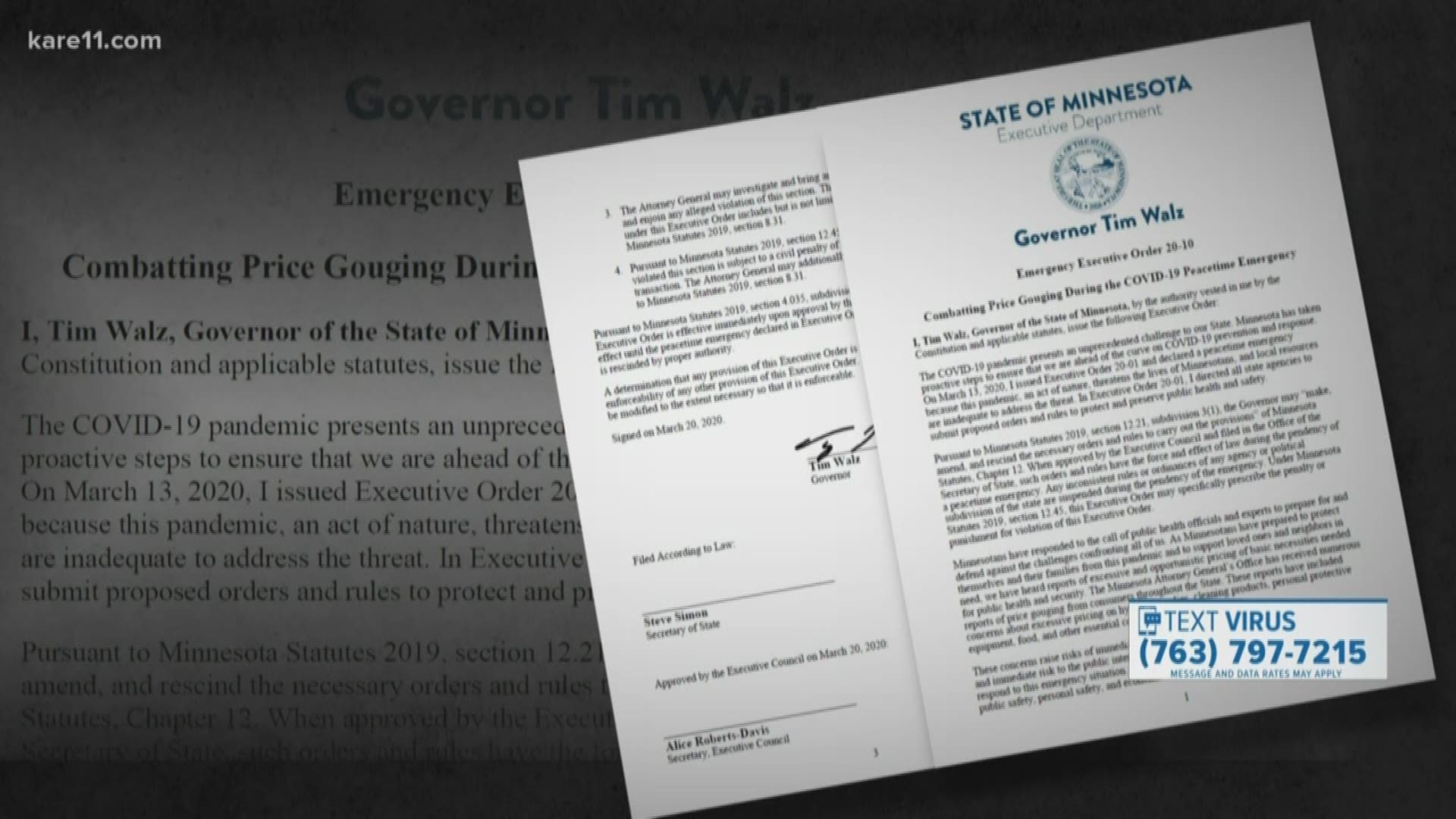ST PAUL, Minn. — Gov. Tim Walz issued an emergency order Friday banning price gouging on food, medicine and other “essential consumer goods and services” in the wake of the COVID-19 crisis.
His action comes after a KARE 11 investigation this week revealed widespread complaints. Although most states already ban price gouging, KARE 11 reported that Minnesota was one of just 16 states that do not.
KARE 11 is working to identify and expose coronavirus related scams and price gouging. It you have an example CLICK HERE.
“It’s a huge problem,” said DFL State Representative John Lesch of St. Paul told KARE 11 during an interview earlier this week. “You can go to a market two blocks down (the street) where a bag of rice is selling for three or four times what it was two-weeks ago.”
Rep. Lesch introduced legislation to ban the practice. Gov. Walz’s emergency order largely mirrors that proposal but goes into effect quickly – at 5 pm Saturday, March 21. It continues for the duration of the coronavirus emergency.
The order bans most price increases of more than 20 percent for a wide range of items – including “food, water, fuel, gasoline, housing, shelter, transportation, health care goods and services, pharmaceuticals, medical supplies, and personal hygiene, sanitation, and cleaning goods.”
Walz said the emergency order was needed because the COVID-19 pandemic “presents an unprecedented challenge” to Minnesota.
Under the order, which has the force of law for the duration of the peacetime emergency, the Minnesota Attorney General’s office will have the power to investigate and impose a civil penalty of $10,000 for every improper sale.
Attorney General Ellison said, “This purpose of the order is to stop pandemic profiteering and at a time of great uncertainty, help Minnesotans afford their lives.”
A dedicated price-gouging complaint form is now live on Attorney General Ellison’s website.
The Attorney General’s Office has received 150 complaints about price-gouging in the past week. The most commonly complained-about items are water, rice, butter, toilet paper, bleach, masks, hand sanitizer, and allergy medication.
In a press release, Ellison said, “We recognize that not every retailer who has raised prices (on) these essential items since the start of the crisis has done so just to line their pockets. To them, I say: you’re protected. Any retailer who has had to do so because of factors out of their control is not covered by this order and is explicitly protected from its enforcement provisions.
“My hope is that we won’t have to use this power, or that we will only have to use it sparingly. The point isn’t to file a lawsuit. The point is for people to comply with the law to protect consumers. The point is to help people afford their lives in this emergency,” Attorney General Ellison concluded.
MORE INVESTIGATIONS: KARE 11 Investigates: What’s causing the COVID-19 testing delays?
MORE INVESTIGATIONS: KARE 11 Investigates: Coronavirus scams spread
KARE 11’s coverage of the coronavirus is rooted in Facts, not Fear. Visit kare11.com/coronavirus for comprehensive coverage, find out what you need to know about the Midwest specifically, learn more about the symptoms, and keep tabs on the cases around the world here. Have a question? Text it to us at 763-797-7215. And get the latest coronavirus updates sent right to your inbox every morning. Subscribe to the KARE 11 Sunrise newsletter here. Help local families in need: www.kare11.com/give11.
The state of Minnesota has set up a hotline for general questions about coronavirus at 651-201-3920 or 1-800-657-3903, available 7 a.m. to 7 p.m.
More information on the coronavirus:

